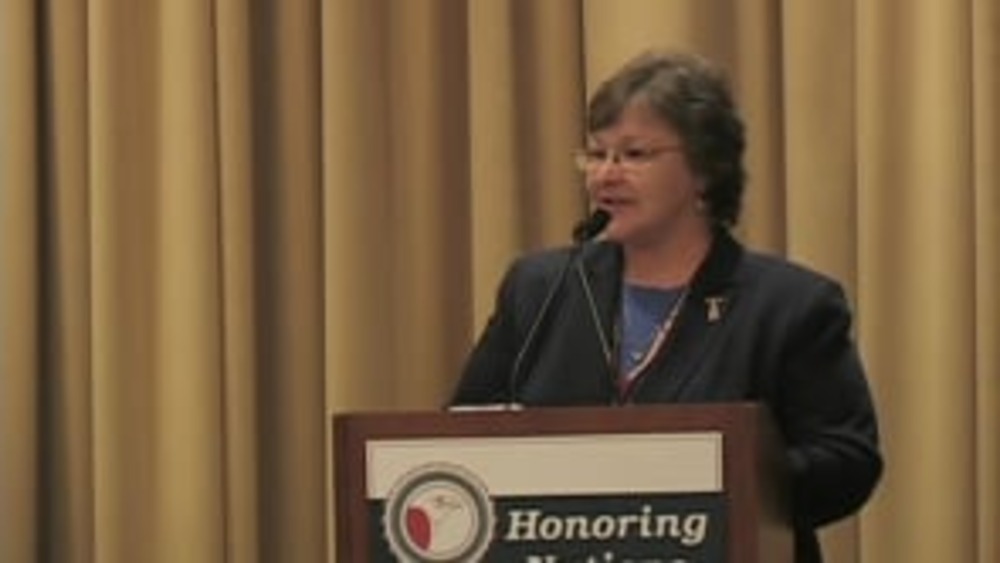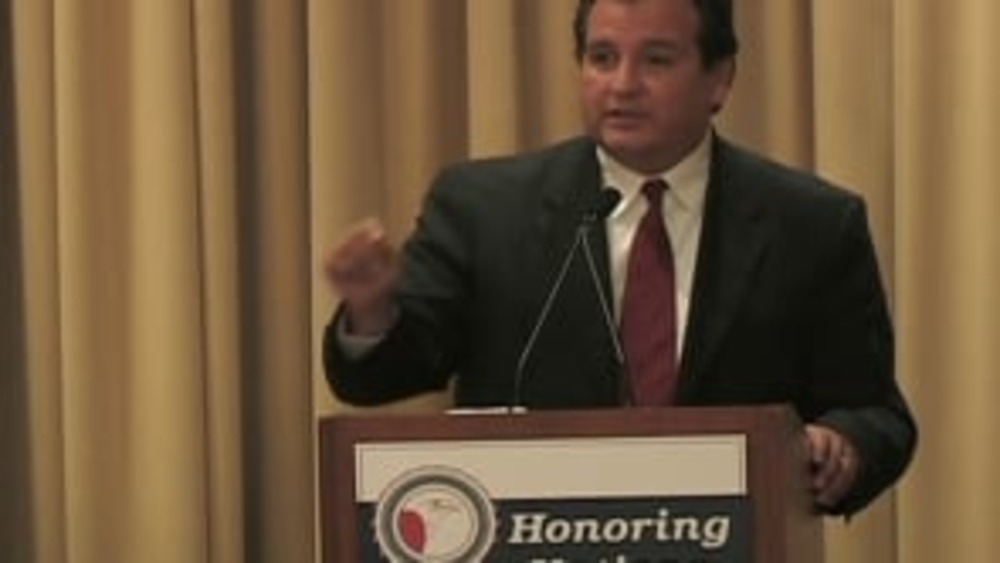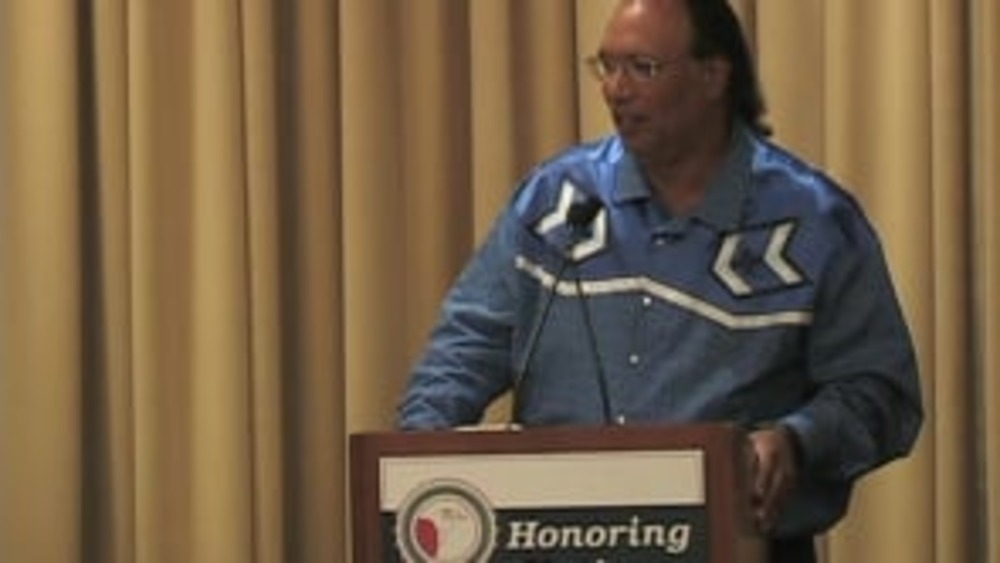Now-former Quil Ceda Village Director John McCoy talks about how and why the Tulalip Tribes established Quil Ceda Village, and also reflects on his tenure serving in the State of Washington Legislature.
Additional Information
McCoy, John. "Sovereignty Today." Honoring Nations symposium. Harvard Project on American Indian Economic Development, John F. Kennedy School of Government, Harvard University. Cambridge, Massachusetts. September 17, 2009. Presentation.
Transcript
"Good afternoon. So you're all ready? I'm the last speaker. You can't wait to get out the door, right? I can't disagree with anything that was said today. It was all very important, to the point, and very informational. A lot of these conversations have triggered some more thoughts for me, and as some of my friends here say, 'That's dangerous,' because then I go off and do something. But anyway, you gave me a tough assignment; Harvard gave me a tough assignment. They want me to talk about Quil Ceda Village, which I can talk eight hours on. And then they want me to talk about my life in the state legislature, which is another eight hours. And you want me to condense it in 15 minutes. So, I will do the best I can to get all this done in 15 minutes.
First of all, we created Quil Ceda Village in 2001, but the seed of the village was planted in the summer of '94. What happened, I was recruited by my tribe, my own tribe, to come back home to be the business manager, do economic development. So I came back and the attorney that we have now was actually hired before me -- but he didn't get to work until a month after I started -- and that's Mike Taylor and a number of you know Mike. So I know my mission and I get Mike's office set up and all that jazz. And then that summer, I went to Mike and I said, ‘Mike, we -- you and I -- are charged with economic development. You the legal side, me figuring out what we're going to do. How are we going to get at the taxes?' And those of you who know Mike, you know that little smirk he gets across his face, ‘Ah ha ha ha ha ha. Here you are, John McCoy, we've been fighting this issue for 500 years, and you think you're going to solve it.' I said, ‘Well, Mike, I just had to ask the question.' And so we talked about it for a couple hours and then I had to go off and do some work. And then later in the summer I came back and I said, ‘Mike, what are we going to do about the taxes, I want to talk about this some more.' And he said, ‘I've already done something.' Mike at the time was a professor at the UW [University of Washington] Law School, and he made it a class project. How can Indians get at the taxes? And he told the class to go all the way back to the very first case and follow it all the way up to present time. So law school's three years, right? We're patient, right? We're all patient. So I patiently waited. And then Mike came in and he says, ‘Okay, we got it done, got the report here.' And I said, ‘I don't want to read it because I know it's all in legalize. I wouldn't understand it, so give me the thumbnail.' And he said, ‘Geez.' And I said, ‘Yeah, just give me the thumbnail.' And it's quite simple, 'cause most of you practice it already. All it is, to get at the taxes: one, it's got to be on trust land; two, you need to use your own money to put in the infrastructure; and three, it's got to be managed by an Indian. That simple. It is that simple. It's getting there that's not so simple, because then you have to have the resources to put in the infrastructure -- water pipes, sewer pipes, roads, street lights, traffic lights, law enforcement, court system -- you have to build all those. And there have been conversations around this all day long.
And so we embarked, and one of the, we started that project and then Mike came to me and he said, ‘Okay, now that we've kicked economic development off, now it's time to retrocede.' And I said, ‘Retrocede?' So he had to explain [Public Law] 280 to me. I said, ‘Oh. So now I've got to go down to Olympia to convince all those yahoos about Indian law and why they've got to retrocede.' And we did it. It took us two years, but we did it. We moved on. Our biggest problem was the BIA [Bureau of Indian Affairs]. They didn't want to have to sign off on it, because they didn't want to have to fund it. They were quite open. ‘If we sign this, then we've got to fund it.' And we said, ‘No, we're going to fund it ourselves. We told you that and we put it in writing.' But they said, ‘But you could come back to us and demand that we fund it.' We said, ‘Well, that isn't our intent.' Well, anyway, they finally signed off on it. So we got the retrocession. We start creating our police department and it's in place now. It's got 29 officers. This week we're installing our own E911 system. As you heard, the court system is up and running and doing quite well. We're getting a lot of folks coming in. We've had people from Afghanistan come in to look at our court system, from Iraq and a few other countries, just to come in and look at our court system. So it's doing quite well.
To finish off the Quil Ceda Village story, we had the BIA saying, ‘Nah.' Excuse me -- I need to back up a little more. We created the paperwork to create a federal city -- and as you know, back then there was only one in existence and that was Washington, D.C. Navajo has a city, but it was chartered for a totally different reason. So the Navajo were the first one to incorporate a city within their, under their tribe. It's their political subdivision. We went the extra step and we had to get BIA approval, well, [U.S. Department of the] Interior and IRS [Internal Revenue Service] and the Justice Department to get them to sign off. Well, we got Justice and IRS to sign off but the BIA just wouldn't do it. God, we argued with them, we fought with them, made many trips back. They just didn't want to do it. So Mike -- he's a great attorney -- he started looking at the structure of the BIA and what, primarily what was delegated down to the area and the regional offices. Guess what? Signing off on the city was delegated all the way down to Puget Sound Agency and she signed it. Not too long after that, that authority was revoked [and] sent all the way back up to central office. So I'm sorry, folks, you'll have the longer row to hoe.
So I set about putting in our infrastructure and the first thing I had to worry about was sewer systems. Well, I was negotiating with the City of Marysville and that was painful. That was really painful [because] that council -- they had five members -- four out of the five were purely anti-Indian. It was obvious. So I tried negotiating with them, negotiating, negotiating and I said, ‘Well, what would it take?' And their lead negotiator said, ‘Okay, you have to pay for 75 percent of the upgrades and we won't guarantee capacity.' 'Then why would I want to do that? I might as well build my own plant!' So that's what we did. We went and built our own state-of-the-art plant. I'm serious. It's state-of-the-art. This is membrane technology. The UW, University of Washington and Western Washington University, just issued draft reports we commissioned, but the output of our plant exceeds federal drinking water standards. That means you can drink it, but you can't get over the thought where it came from. So what we're doing, we're injecting it into the ground. We're irrigating with it and now, because of these reports, once we make them final and we get them filed with EPA [Environmental Protection Agency], we'll be able to discharge directly into wetlands and streams and rivers because we do no harm.
The reports show that this technology takes out all pharmaceuticals, including disruptors -- disruptors are birth control pills. Now a lot of folks say, ‘Well, tell everybody to quit throwing away their pharmaceuticals down the sewer.' That isn't the problem. Everybody has to pee. Pharmaceuticals do not break down in the human body. They just pass through. So we have to get it cleaned up. Because of this technology and what we've been able to do there at Tulalip, the City of Seattle changed their major bright water project over to that technology. We have cities in and around us that are changing over to that technology -- Jamestown S'Klallam, Ron Allen -- they're going to that technology and it's starting to pop up all over the U.S. We need to have more of it. We need to get technologies that we can put into individual septic tanks so that can get cleaned up so we're not putting it into the streams and rivers along with nitrates and a number of other things. That's an all-day subject by itself, if you want to know. And I've got five minutes to talk about my legislative life. Quil Ceda is doing great. We did all the work ourselves, paid it all. And those contractors that would not agree to our TERO [Tribal Employments Rights Office], we kicked them off the res. So you can do that. If they don't want to do TERO, tell them to take a hike. Then you go to the next lowest bidder. You get to write the rules, just follow the rules once you've written them.
So, my life in the state legislature. Everybody asks, ‘What's your toughest job?' My toughest job is serving two sovereigns and if, at the end of the day, if I did no harm to either, I've had a great day. I've had a great day. Now, the politics of the res and the politics down in Olympia -- my tribal elected and my fellow citizens, they ask me, ‘How is it down in Olympia?' I say, ‘Hell, I go down there to rest and kick back and relax.' They say, ‘What?' I said, ‘The worst politics is here at home. That's family politics. That gets nasty. And everybody remembers what your great grandmother did to so-and-so's great grandmother and it won't go away. But down in Olympia, who I'm arguing with right now, five minutes later he probably needs my vote on another issue. So he don't want to piss me off and I don't want to piss him off, or her.'
Going down there -- we have three Native Americans in the Washington State Legislature: myself, Senator Claudia Coffman -- a lot of you know, Nez Perce -- and the other one is Jeff Morris, he's an Alaskan. We had a fourth, but he lost his election last time. He uttered the hateful words, ‘I believe in personal income tax,' and it killed him. I've been successful. People like to label me the representative from Indian Country. I think I've proven [to] them that I represent all the citizens within my district. Within my district, Native Americans, the voting population is less than one percent, so I've got a whole lot of non-Indians to convince I'm the right guy for the job and I've been able to do that. I'm in the fourth term, my seventh year. Hopefully next cycle I will be unopposed so I can do something else.
I've been successful in getting a number of pieces of legislation passed -- tribal law enforcement, tribal history and culture, language, achievement gap study -- and now there's an implementation plan being developed and built on that. One of my peers last session, she sent me an email and said, ‘Look up bill so-and-so and tell me what's wrong with it.' So I pulled it up and looked at it and I said, ‘You're right, it sucks.' And she said, ‘Well, what's wrong with it?' And I said, ‘One sovereign is trying to tell another sovereign what to do and you can't do that. You can negotiate, but you can't tell them what to do.' And this was over fire district and what services were going to be provided and at how much. And what they wanted to put in the bill was the formula that the tribe was going to pay. And I said, ‘No, you just put in there that they will negotiate.' So that's what I do. I make sure no harm is done to either side. That's the toughest job.
I do have another sidebar job. I'm chairman of the National Caucus of Native American State Legislators. It was started by Senator Fred Haney from Oklahoma back in '92. He took it for a few years and it kind of faded out because of lack of funding. Well, we started it back up in 2003 with money from Kellogg. When we restarted there were 23 Native American legislators. Today we're just short of 80. We have about 25 to 30 that are active in the National Caucus. Our annual meeting is next week in Scottsdale. There we exchange ideas on how to get bills passed or ideas for bills. And I'm also working with the National Hispanic Caucus, the National Black Caucus, and the Asian Pacific Islanders. We're talking about having a collaboration between the four of us in that, when we have a common interest piece of legislation, that all four of us walk up arm-in-arm on the capitol hill and say, ‘Hey, this is an issue, we need to take care of it.'
I still love working in the legislature. It was just kind of a natural thing. I was a tribal lobbyist and doing economic development and I just kind of fell into it. But I'm having fun and I love coming here and meeting, re-meeting all my friends here. Some of you guys -- the rest of you don't know -- Tulalip likes to do economic development studies. Well, Joe Kalt, Miriam [Jorgensen], Jonathon Taylor and a few others here have had to sign confidentiality statements with Tulalip because they know as much as I do and that's dangerous. So we do a lot of economic development studies and you need to also. If you're going to educate the public about you and what you're doing, you have to let them know what you're doing, because they'll sit back there and believe the lies and the untruths. So you have to educate them. Ready for your questions."



